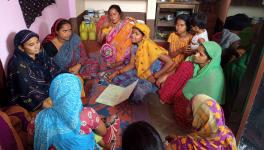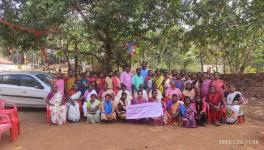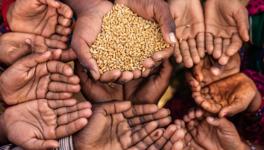People’s Restaurants in Kerala Step in to Feed the Hungry
On the day India slipped to the 101st position on the Global Hunger Index (GHI), a peer-reviewed annual report that measures and tracks hunger, Sreelata was at her workplace at 8.30 am as usual. Sreelata, along with three other women from her Neighbourhood Group (NHG), which is part of Kerala’s Kudumbashree community network, runs a Janakeeya Hotel (Peoples’ Restaurant) in Kolazhy, Thrissur, which provides subsidised meals to the public.
Across Kerala, 1,132 such restaurants run by close to 5,000 Kudumbashree members cater for more than 1,50,000 people daily and are an integral part of the state government’s efforts to end hunger.
While the unprecedented loss of jobs and earnings due to the pandemic and ensuing lockdown pushed a large section of Indians to the brink of starvation, Kerala has managed to avert that kind of disaster because of its social security net and the combination of large-scale programmes like setting up of community kitchens, provision of monthly ration and grocery kits to all families and subsidised meals through the Janakeeya Hotels. The popularity of such measures contributed to the historic mandate of the ruling Left Democratic Front (LDF) in the Assembly elections earlier this year.
Though the Centre has questioned the findings of the GHI report, indicators of the increasing food insecurity in the country, even prior to the pandemic, were captured in the government’s own reports, including the National Family Health Survey. Tackling this grave issue will require a concerted effort by government agencies and community members—and the Janakeeya Hotels are a good example of a successful initiative that can be tailored according to local needs.
Kudumbashree Network and ‘Hunger-free Kerala’
Kudumbashree is a women’s community network and poverty eradication mission set up in Kerala in 1997 on the recommendation of a three-member task force appointed by the then-LDF government in the context of the devolution of powers to local self-government institutions in the state and the Peoples’ Plan Campaign.
Kudumbashree is open to all adult women but limited to one membership per family. It has a three-tier structure with NHGs forming the primary level, Area Development Societies at the ward level and Community Development Societies (CDS) at the local government level.
Kudumbashree, one of the largest women’s networks in the world with a total membership of more than 45 lakh women, undertakes various activities, including running microenterprises, farming collectives, IT units and gender helpdesks and carrying out the poverty alleviation and skill development programmes of the state. As of September, there were a total 294,436 NHGs across the state, including those formed by the elderly, the disabled and the transgender.
Support for starting 1,000 fair-price restaurants by Kudumbashree, as part of the state government’s ‘Hunger-free Kerala’ programme, was announced by former finance minister Thomas Isaac in the 2020-21 Budget. It was the statewide expansion of a similar initiative run by a local cooperative in Isaac’s own constituency of Alappuzha that was designed to cover all the 941 grama panchayats in the state.
With the support of local self-government institutions and the civil supplies department, the restaurants enjoy a subsidy of Rs 10 from the state government for every lunch sold at Rs 20 to the public. The space/rent and electricity and water charges are borne by local self-government institutions, and the civil supplies department sells them rice and provisions at subsidised rates. The concerned Kudumbashree CDS provides a one-time revolving fund of up to Rs 50,000 as initial working capital.
The Janakeeya Hotel run by Sreelata’s NHG is located in a small hall and adjoining kitchen space next to a fair price shop run by the civil supplies department in a three-storey building of the Kolazhy Grama Panchayat, on the outskirts of Thrissur town. With the outbreak of the pandemic and ensuing nationwide lockdown, the state government turned to Kudumbashree members and other volunteers to manage community kitchens with the support of local self-government institutions so that people in the state did not go hungry.
Sreelata and the other two others of the NHG had already received training and low-interest loans to start a catering service prior to the pandemic and had large cooking utensils and equipment with them. Upon the state government’s call, they immediately set up a community kitchen with the help of the grama panchayat in the premises of the Zenana Mission Lower Primary School in Kolazhy.
During the first wave of the pandemic, the NHG worked with the Rapid Response Team of the state health department to deliver packed lunch and dinner to around 500 people everyday according to the lists of the needy prepared at the ward level.
With the easing of lockdown and people in the area getting back to work, Sreelata, Sindhu and Sini decided to convert the community kitchen into a Janakeeya Hotel and shifted to the present building.
Omana, who is a CDS member, has been working with Sreelata and the others. From around 11.30 am to 3.00 pm everyday, they provide the subsidised meals to around 120-150 people in the area. Each meal includes rice, sambar/dal/moru curry, thoran (stir-fried vegetables) and a locally-sourced vegetable dish along with pickle. Besides the usual lunch, the menu also has chicken curry, fish curry and fry, beef fry and kaya beef (a dish containing beef cooked along with raw banana) and chicken biriyani on Sundays. Though these dishes are not subsidised, the Kudumbashree members sell them at prices a tad lower than the regular market rate.
“We don’t make much money by selling lunch but selling the other items on the menu is profitable,” Sreelata told Newsclick. Sreelata, who is a mother of two, and the other women rely on extra income from other jobs to support their families. Sreelata works at a chit fund company while Sindhu and Sini are domestic workers.
“For the restaurant to become a profitable enterprise that can provide a regular income to the NHG members, we will have to expand the services to include breakfast and tea and snacks during evening,” said Sujatha, who is the chairperson of the model CDS in Kolazhy and oversees the working of 48 other microenterprises in the area. “The group has to now decide whether to work full time in the restaurant or use the services of another NHG so that they can run it in shifts,” she added.
Three kilometres away in Mulangunnathukavu, another Janakeeya Hotel is situated adjacent to the grama panchayat office. The restaurant, which has a more spacious hall than the one in Kolazhy, is run by four Kudumbashree members who had worked in waste management for the Haritha Keralam Mission of the state government.
Set up in June, this Janakeeya Hotel provides daily lunch to more than 200 people. The Kudumbashree members, who also take catering orders from nearby areas, cater for auto/taxi drivers, panchayat employees, migrant workers and others from 7 am to around 5 pm.
Rajesh, a daily wage worker who had come to buy two lunch parcels for his family, told Newsclick that the subsidised meals have been a huge help during the pandemic. “Despite having more money now, I still come here regularly because it is convenient and the food tastes as if it has been cooked at home,” he said.
In Thrissur district alone, there are 107 Janakeeya Hotels apart from other Kudumbashree-run restaurants, canteens and catering services. Many local self-government institutions also order from the Janakeeya Hotels to provide free meals to those in need and they act as delivery units to provide food to containment zones.
More Janakeeya Hotels on the anvil
A support system for the Kudumbashree-run canteens and home-based catering units was established in 2009 by the then-LDF government. Later, as part of the efforts to provide a larger market base for women-run enterprises, the Kudumbashree Mission established the brand name Café Kudumbashree. A professional training facility named AIFRHM (Adebha-Adhithi Devo Bhava- Institute of Food Research and Hospitality Management) was set up in Thrissur under the leadership of the District Kudumbashree Mission.
The institute provides technical and marketing support for the Kudumbashree-run restaurants, mini-cafes, kiosks and catering units across the state, the vast majority of which were started during the tenure of the previous LDF government. Kudumbashree members have also mentored the setting up of restaurants and community kitchens in Bihar, Jharkhand and other states.
Kudumbashree services and the Janakeeya Hotels have become part of Kerala’s culture and cherished symbols. Recently, the public reacted strongly to a critical story done by a Malayalam television channel on the functioning of the Janakeeya Hotels with several people taking to social media to post pictures and videos recounting their experiences of eating at the restaurants and refuting the media outlet’s narrative. Recognising the popularity of the restaurants and their success in working towards the goal of ‘Hunger-free Kerala’, chief minister Pinarayi Vijayan announced earlier this month that the state government is committed to helping set up more Janakeeya Hotels.
Get the latest reports & analysis with people's perspective on Protests, movements & deep analytical videos, discussions of the current affairs in your Telegram app. Subscribe to NewsClick's Telegram channel & get Real-Time updates on stories, as they get published on our website.
























